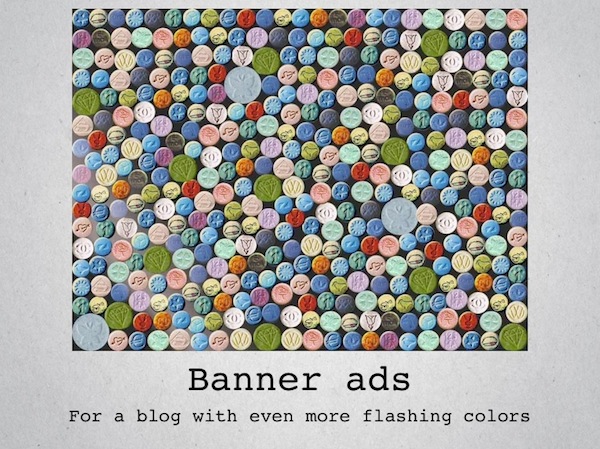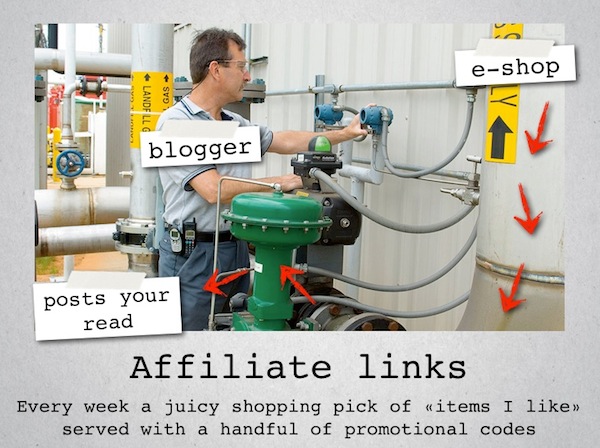Disclaimer: Today, we’re drifting off the topic of men’s fashion slightly, but it’s really important that we give a more detailed explanation of our policy concerning advertizing on the internet. We think there is some taboo surrounding the subject and that this is unnecessary. We also think that once you understand how a certain medium works, you’re better placed to judge its objectivity.
We’ve been wanting to say a bit on the subject for a while now because after 5 years of blogging, we’ve had time to think about the pertinence of the game played between advertisers, press agencies and bloggers…and the readers. If you’re looking for an article on nice fits and beautiful materials, feel free to call again later. As for the rest of you, keep on reading! 😉
Displaying adverts on blogs – complete nonsense if you ask us
Why adverts?
In the blogosphere of fashion blogs (and not just men’s fashion) there are quite a lot of adverts. Even if AdWords adverts seem to be gradually disappearing, the display of banners, personalized themes (i.e. when a site temporarily takes on the colors of a brand) or ad inserts is becoming increasingly common. Why do bloggers do this, especially in the realm of fashion?
Quite simply because when you put a lot of time into building up your blog, you want to make a bit of money out of it. On top of that, the topic’s a bit taboo. I mean, a blogger should never say that he wants to earn a living or enough to help with living because ts from his blog. So, when speaking of this, they use a specific expression, i.e. ‘monetizing the audience’.
In concrete terms, ‘monetizing the audience’ is a response to a really simple problem that occupies the minds of a hell of a lot of bloggers but which must remain absolutely confidential: how to earn x dollars with the x readers who check out the blog every day?
And so, spontaneously, they turn to the display of ads on their blogs because they think that’s the only way to earn money…without making their readers spend money (I’ll talk about affiliation later). On paper, this is the ideal solution: it because ts my readers nothing and I still earn money! And the more readers there are, the more I can charge! What could be better for you, sir?
But then, all that, it’s a bit like full time employment, communism or cashmere sweaters for less than 120 dollars: it looks good on paper, but in reality, I’m convinced it’s complete nonsense (OK, so I might be releasing the kraken by saying that, but it’s been niggling away at me for a while!)

A dummy’s game?
In fact, it’s the actual principle of having ads on a blog that bugs me. When an advertiser pays you, what is he paying you for? Either for displaying a banner on a few pages (often thousands of pages…) or for every click on said banner (we call that the ‘ cost per click’, the famous CPC to look out for!) And it’s here that we might want to ask a really simple question: but in concrete terms, where’s the creation of value here?
OK, that might not be a very concrete problematic, especially for a blogger who just wants to pay his rent. But – and this is the second point that’s really important to me – ads are total nonsense because you’re paid so that:
- Your visitors are put off their reading of your blog by a distracting ad banner. And yes, we can still assume that the reader will pay at least some attention to the flashy banner in front of his eyes.
- In the worst case scenario, your visitors will stop reading and leave your blog. Yep, you’ve got it, when you’re paid per click on an ad, the click will send your readers away from your blog! (well, they’re hardly just gonna be sat there clicking away for the hell of it!)
And you know how much you’re paid for each visitor that leaves your blog?? A handful of cents! In the best of cases, about ten cents…
It’s a real shame: you spend time creating decent content, great articles…and then let people pay you to be parasites on the message you want to communicate. But for crying out loud, where’s the creation of value here? (and I’ve not even mentioned you becoming dependant on advertisers once you’ve started meddling in such affairs – there’ll be a direct impact on your articles!)
Personally, that would really piss me off if you were to read one of my articles only to click on an ad and never finish reading (and in the worst case scenario, never to come back to my blog). As a blogger, that doesn’t really motivate me to keep providing in-depth and well-researched content!
That’s why there are no ads on Kinowear, because we want out work to be read and not to be plagued by the parasite of a mega brand’s banner (no, smaller designers do not advertize on blogs…) I’m not against ads on the internet…they’re essential for some sectors…it’s just that I feel that that could cause a problem for fashion blogs.
It’s funny you should say that, Nicolas…when you actually have a pop up to get hold of my email address…
It’s true, and we spent a lot of time thinking about whether we should use that pop up. But it’s the only thing we ask of our visitors. And that’s all. Once you’ve done it once, you’ll never be bugged by it again. And after, readers get loads of little useful bonuses by mail. And no, we don’t sell our email database to ad companies! For us, this is a privileged way of communicating with you without having to go through the blog. If we had to systematically communicate with you regarding certain projects via the blog, there’d be a real circus!
The limits of displaying ads
In concrete terms, there are four things to take into account:
- The advertiser (brand or e-commerce site) at the roots of the message
- The management who’s in charge of diffusing the message to the contracted blogs
- The blogger who’s paid for the number of times the banner’s displayed
- The reader who’s attention is being resold
The insidious problem of advertizing is that it calls for quantity and not quality. In fact, the only real way a blogger can try to increase his revenue here is to increase the number of pages viewed… because that’s what’s sold directly to the management.
As it’s complicated, after a certain point, to find new readers, he increases the number of articles (reducing their intrinsic quality, because he can no longer afford to spend four hours on a SINGLE article). In the most extreme cases, he tends to save time be simply reformulating press statements (this happens a lot with hi-tech blogs) and checking sources less carefully, or in the case of fashion blogs, the quality of the products mentioned is no longer well-checked. There aren’t enough men’s fashion brands of high quality to be able to write on a daily basis: so content has to be found so that something can be written right now, on the spot, immediately, without wasting a single second…
That’s what I call junk news!

In order to find new readers, the topics covered also tend to become more diverse and the blogger dilutes his specialty. Eventually, the readers become aware of this, are less involved in the blog and the blogger has to compensate for this by creating an even greater number of pages viewed: this vicious circle goes on and on and you end up not reading a blog but a news spot.
So you’re against ads?
No, because the problem with ads isn’t the same in all sectors. This only becomes problematic when the blog concerned offers advice or tests.
It’s less of a problem when the blogger has other sources of income and is totally unproblematic when the blog’s for fun or if the subject that the blog’s about has nothing at all to do with the subject of the ads displayed.
Sponsored articles on blogs
At the end of the day, this is just a variety of ad that’s more intrusive because it’s a whole article from a brand that’s published with the mention ‘sponsored article’.
The limits of the diffusion of sponsored articles
If someone says they’ve been bribed, does that make them innocent? In reality, no. But of course, the answer is yes on the internet.
But here there are two big questions:
- How can you criticize a brand that bought ad space on your blog last month?
- Even more difficult: How can you criticize any brand when you fear to then lose all of your potential advertisers (and your salary along with them!)

As someone who wrote sponsored articles a few years ago, when I actually liked the product, I can tell you now that I felt the pain of being caught between the two. Now, Kinowear doesn’t do any at all.
Do the test
Open a men’s mag (doesn’t matter which). Look at the brands proposed in its selections (presented as objective) and the shootings… Ralph Lauren, Gucci, Giorgio Armani, Zegna, Calvin Klein, Banana Republic
Now look who’s buying ad space in the mag: SURPRISE!! It’s the same brands! (bet you didn’t see that one coming!)
That’s exactly what sometimes happens on some big fashion, hi-tech, cinema and music blogs, etc…and the extent to which this occurs will soon be just as bad.
Once again, we’re not against monetizing information (on the contrary as that allows you to assure quality). BUT we do question the consequences of some methods of monetization.
The case of affiliation on blogs
Now we’re coming to something that’s even more insidious.
What’s affiliation? Imagine you’re reading a blog that recommends a certain pair of shoes. If you buy the shoes via the link on the blog, the blogger will get a small commission on the final sale (about 10% on a concrete product). The principle is completely fine: you lead a client to the e-shop so it is totally normal to be paid in thanks.
The limits of links of affiliation
The problem is that because you don’t earn all that much through affiliation (10 dollars on a pair of jeans sold for a hundred) you’ll want to see great numbers sold: more traffic, more affiliated products and, obviously, a bit less independence because you’ll be doing everything in your power to make sure your readers buy the product in question.
Furthermore, that’s why affiliation links aren’t labeled as such on blogs (even if you can recognize them thanks to their highly characteristic URL…) and the reader wonders if it’s an affiliation link or not…placing into doubt everything written by the blogger because he hasn’t been honest!

Below, I’m talking about my experience on our French website : BonneGueule.fr
A few years ago, I briefly tried out affiliation and again one final time in January 2011. Frustration + feeling of not being gratified + feeling crap for doing something people don’t like (forcing me to choose a selection of clothing when I’ve always preferred choosing products and writing my own point of view).
I know Jay an Benedict, who used to run Kinowear shared our thougths on that. You may still find a few lost affiliate links, for the guys among you with a passion for archeology, in old posts but I guarantee you we have no idea where they are or how we could claim this money (that we don’t need, nor want).
The case of affiliation on digital products
In my opinion, this is different because in general all products of this kind can be refunded – you simply have to ask. If a reader feels let down having bought such a product by following an affiliation link (PDF, video etc, such as the Kinowear Bible and Kinowear Program) there’ll be no problem being refunded quickly, without sending the product back and without negotiation. And for me, this changes everything because this guarantee is enormous in the minds of readers.
I also find that the profit is shared in a really fair way: in general, someone who displays a link of affiliation for a digital product gets at least 50% of the final sale price.
But once again, this only concerns me. For example, some people think that the reader has enough common sense to be able to make his own choice or that affiliation doesn’t need to be shown to be what it is because a blogger needs to remain objective in order to maintain his readership…
- But do you (really) have enough knowledge to be critical in all sectors?
- How are you supposed to know if something’s objective when you’ve read it, say, 3 times?
- And do you always have the time to think about these questions when you’re taking in info?
Learn to spot an affiliated link
So, you’re ready to take the red pill? It’s time for a little practical lesson.

It’s really easy to recognize an affiliated link. Most can be quickly spotted because their structure contains the name of the platform of affiliation: this is the program that the blogger uses to offer you his selection of products or tell you to buy what he’s just shown you.
Place the arrow on the links (they won’t give any commision to anyone because I don’t want to make this personal and have therefore changed them) and you’ll see that they have a very different structure to that of a classic link:
- Afilliate free link: Cool watch available at Amazon.com
- Affiliate link: Cool watch available at Amazon.com
Sometimes it’s a link that points to another link and not directly to the address of the e-shop, somehting like that
- http://www.awin1.com/cread.php?awinmid=2077&awinaffid=534412&clickref=&p=https%3A%2F%2Fwww.amazon.com
Another tip: some links contain something along the lines of ‘id=addressofthesite.com’. This is affiliation, too, even if you’re not told so:
- Make the most of a promo code of -15% on all the e-shop with the code WELOVEYOU
Even if it’s often just a number instead of the address of the blog like in the link below, they are STILL affiliated links:
- Make the most of a promo code of -15% on all the e-shop with the code WELOVEYOU
Now you know how to tell the difference between a spontaneously recommended product and…an affiliated product that means the blogger is paid if you buy it.
At the end of the day, you’re against the monetization of the blog!
Once again: no! Completely on the contrary…We’re going to live that experience!
We’re aware that being a blogger is initially a long and hard process. Lots of people like what you do but the time you spend doing it, the energy you put into it and sometimes the frustration when you see that not everything is as you would like gets a bit draining after a while. You’ve a good example of that when you look at the earlier frequency of publication of our articles…it was very irregular. Back then, I was on my own and in all honesty the blog brought in pretty much nothing per month.
Launching the Kinowear Bible was immensely beneficial for the blog and for our motivation. And now I’m gonna be really honest with you: it allowed us to have the necessary funds to launch a bigger project such as the Kinowear Program.
This is why I think bloggers SHOULD make money from their blog. It motivates them to keep producing quality content and this, inevitably, leads to an increasingly high standard.
So, obviously, there are some exceptions but in the majority of cases, it’s often hard to keep up motivation when you’re doing all you can and getting nothing back for it (and the work includes responding to every single email you get asking you for advice). And in particular when bloggers earn money from their blogs, they can afford to reinvest in their passion: that could be to pay for a trip to go and visit a cashmere factory or video gear to create new content.
But Nicolas, how can I earn money if I don’t display ads?
There are tons of other ways to make a living. We chose that of ‘digital products’ and service (coaching).
But others become lecturers, others write a paper book, others make a DVD and others boost their career or change job. There are some who set up their own business, popularize their inventions and develop social networks relating to niche subjects. And there are still lots of other options left to explore, options that the blogger can be proud of. It’s just a question of effort, creativity and listening to the problems faced by readers.
Let’s cite, for example, Julien Scavini (link) who is a shining example of pedagogical generosity who uses his blog as a display window for his tailor’s services( he’s just opened his store for that matter!)
And the most encouraging thing? It’s that your readers are the first to tell you that all work deserves a salary! I’m not joking, the vast majority of your readers have a huge respect for values such as work, effort and a will to stick to your thing, and they know how to thank you and support you in their own way. You just need to give them the chance to do so.
To finish…
Friends, bloggers, we appreciate you and respect your work. This article is aimed at nobody in particular. However, we thought it was important to inform our readership about this because all of these thoughts about the income of bloggers have been niggling away at us for a while now.
Friends, readers, don’t reject a blog that monetizes with ads or affiliation: there are many blogs who do this and have a strong ethical policy, too: Gentleman’s Gazette, Real Men Real Style, Style Girlfriend or Dappered etc…There might be a banner but the content is still of excellent quality which proves beyond doubt that the blogger has not sold his soul to the devil. Support them and motivate them! Post an encouraging comment under an article! It’s a small step for the reader but a giant leap for the blogger!
As for us, we stick to our promises even if it isn’t the easiest way to do things. It’s simple: we don’t see things any other way. Read our Manifesto



Hey guys, feel free to express your ideas 🙂
Dan at TropicalMBA had a great saying that having advertising means someone else can monetize your audience better than you can, so there is a fundamental flaw in your value delivery system (like you said).
I think it comes down to what problems are you solving for the audience, and are they big enough? Your Kinowear Bible solves the problem of fashion basics, which is much more impactful than some 5-tips vanilla article I see on most other blogs.
What are your thoughts on brands that pay for sponsored articles on blogs?
Hi Terry,
This punchline from Dan says it all!
Thanks a lot for this great comment. As I mentionned earlier I’m a great fan of the TropicalMBA podcast (readers, check it out
Thanks for your support I do hope we solve the problem the best way we can.
Regarding brands paying for sponsored posts, in my opinion it’s really the same as brands advertising on blogs. If a blogger with a strong community doesn’t have a vision clear enough of what is business is all about and is ok with ads or sponsoreds posts, brands takong advantage are the smart ones. It’s a sort of growth hacking for the brand.
Next question is: Can a blogger actually have a strong community and be a real influencer while he is displayng ads all over the place and authorizing brands to guest post ?
Thanks Andreas, that’s what we believe too.
Hahaha, yeah obviously 🙂
Thanks I just edited it.
Hi Muhammad,
Thank you, your feedback is really appreciated and I’m sharing it with the whole team 🙂
Nicolas
Hi Antonio,
Thanks a lot, I really appreciate your support on this very special post.
Maybe if the value being delivered is in line with what the audience wants and they are transparent? (I don’t know any examples as I’m new to this space.)
But I see your point on how integrity can be compromised once ad dollars start influencing editorial decisions. Kind of like news channels in the US!
Actually this can probably happen. However I still feel like in that case, why not write the post yourself, I mean if your are willing to endorse it, why not go all the way and write a post yourself.